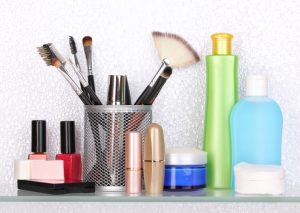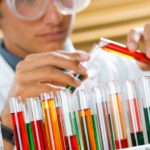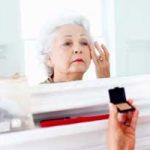 What does your daily routine consist of? If you’re a woman, you may wake up, shower with some scented soap, apply a few layers of makeup and finish off with perfume. As a man, routines may be a bit simpler but still involve deodorant, body wash and other products.
What does your daily routine consist of? If you’re a woman, you may wake up, shower with some scented soap, apply a few layers of makeup and finish off with perfume. As a man, routines may be a bit simpler but still involve deodorant, body wash and other products.
Routine is routine, and you probably don’t give too much thought to it – but did you know your daily routine could be harming your health?
Advertisement
Hidden in all those things that make us clean and beautiful is chemicals. Chemicals give products their cleaning and moisturizing properties, their color, texture and scent. But federal regulations on personal care products have barely changed since the 1930s, critics say, although the proliferation of products – and chemical ingredients and preservatives – have flooded the market.
So what exactly does this mean? Well, to be blunt, we could be poisoning ourselves ever so slowly.
Chemicals in personal care products

Some U.S. senators and the Environmental Working Group, a nonprofit consumer health advocacy agency, are proposing a bill and amendment to give the Food and Drug Administration (FDA) more control over personal care products. This would allow the FDA to review and monitor what goes into the products we use every day, leading to possible ingredient bans and changes.
Why the push? Research has revealed that on an average day women put on 168 chemicals and men about 85. The largest group to put on chemicals is teenagers – they use up to 17 different products, according to the Environmental Working Group.
The bill is being referred to as the Personal Care Products Safety Act, and if it’s passed, you may start seeing changes in many of the products you use every day.
Currently some chemicals that personal care products contain are possible hormone-altering chemicals such as parabens and phthalates.
 Using safer personal care products
Using safer personal care products
The Environmental Working Group has compiled resources for consumers on its website, listing numerous products with their ingredients and potential health risks. Some immediate tips they offer are ingredients that should always be avoided. Some of these include:
Soap: Triclosan
Moisturizer and lip balm: Retinoic acid, retinyl palmitate
Sanitizer: Ethanol in at least 60 percent alcohol
Sunscreen: SPF over 50, Oxybenzone, added insect repellent
Hair: Chemical hair straighteners
Toothpaste: Triclosan
Nails: Formaldehyde, toluene
By reading the labels of your personal care products, you can become a smart consumer and avoid these harmful chemicals. Education is key when it comes to healthy living, and being aware of what is out there can help us make better informed decisions.
If you’re concerned about the chemicals entering your body from your personal care products, once again, always read the labels. Another tip is to cut down on the amount of products you use; do you really need five different types of eye cream?
There is a surge of organic, more natural personal care products on the market. They may be pricier in some cases, but safer for you in the long run. Do-it-yourself products are becoming popular, where people are making their own lip balm with coconut oil or soaps with lavender.
Until the Personal Care Safety Act passes, the FDA does not have much power over what goes into the products we use every day. Until then, though, staying informed is the best thing you can do for yourself and your health.
Related Reading:
What the FDA won’t tell you about food chemicals
Enjoy your toasted bagel first thing in the morning? How about your super-fluffy deli sandwich for lunch or that sloppy pizza slice “on the go?” Although they are labeled as “safe” and “healthy,” these and hundreds of foods in the United States just like them contain a potentially hazardous industrial chemical, according to a new report.
Advertisement
The new toxin lurking in your water bottle
If you were concerned about bisphenol A (BPA) and started to pick up Tupperware and bottles that were labelled BPA-free, you still aren’t in the clear. That’s because recent animal studies have revealed that a replacement for BPA – called bisphenol S (BPS) – may also be hazardous to your health.
